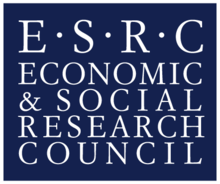Economic and Social Research Council
 | |
| Abbreviation | ESRC |
|---|---|
| Formation | 1965 (as the SSRC) |
| Type | Non-Departmental Government Body |
| Purpose | Funding of social and economic research (at university) in the UK |
| Headquarters |
Polaris House, North Star Avenue, Swindon, SN2 1UJ |
Region served |
|
| Prof. Jane Elliott | |
Main organ | ESRC Council |
Parent organization | |
| Website | Official Website |
The Economic and Social Research Council (ESRC) is one of the seven Research Councils in the United Kingdom. It receives most of its funding from the Department for Business, Innovation and Skills, and provides funding and support for research and training work in social and economic issues, such as postgraduate degrees.
Structure
The ESRC is based at Polaris House in Swindon, which is also the location of the head offices of several other UK Research Councils and RCUK; together the Research Councils annually budget is in the region of £3 billion.
Mission
The ESRC's mission, according to its website, is to:[1]
- promote and support, by any means, high-quality basic, strategic and applied research and related postgraduate training in the social sciences;
- advance knowledge and provide trained social scientists who meet the needs of users and beneficiaries, thereby contributing to the economic competitiveness of the United Kingdom, the effectiveness of public services and policy, and the quality of life;
- provide advice on, and disseminate, knowledge; and promote public understanding of the social sciences.
Brief history
The ESRC was founded in 1965 as the Social Science Research Council (SSRC - not to be confused with the Social Science Research Council in the United States). The establishment of a state funding body for the social sciences in the United Kingdom, had been under discussion since the Second World War;[2] however, it was not until the 1964 election of Prime Minister Harold Wilson that the political climate for the creation of the SSRC became sufficiently favourable.
The first chief executive of the SSRC was Michael Young (later Baron Young of Dartington). Subsequent holders of the post have included Michael Posner, later Secretary General of the European Science Foundation. The current Chief Executive of the ESRC is Professor Jane Elliott who took over from Professor Paul Boyle in October 2014.
Change of name
Following the election of Prime Minister Margaret Thatcher in the 1979 general election, the Government expressed reservations about the value of research in the social sciences, and the extent to which it should be publicly funded. In 1981, the Education Secretary Sir Keith Joseph asked Lord Rothschild to lead a review into the future of the SSRC.
It was ultimately decided (due in no small part to the efforts of Michael Posner, chief executive of the SSRC at the time[3]) that the Council should remain, but that its remit should be expanded beyond the social sciences, to include more 'empirical' research and research of 'more public concern'. To reflect this, in 1983 the SSRC was renamed the Economic and Social Research Council.[4]
Governance and management
The ESRC is managed by the ESRC Council, which consists of the Chair (Allan Gillespie), Chief Executive (Professor Jane Elliot) and representatives from academia, government and industry. The Council approves the ESRC's policies, strategy, budgets and major funding.[5]
Committee structure
The ESRC is guided by five committees:[6]
- Training and Skills Committee - oversees policy for training and skills development, including awards (or studentships) for postgraduate students
- Research Committee - responsible for overseeing setting policy for ESRC's research funding and investments
- Methods and Infrastructure Committee - responsible for overseeing setting policy for data services, surveys, research methods and information environment
- Audit Committee - responsible for ensuring the overall effectiveness of systems of internal control across ESRC
- Evaluation Committee - responsible for advising Council on the successful achievement of its corporate strategy through a combination of evaluation of policy, and research centres, programmes and projects
References
- ↑ "ESRC mission, strategy and priorities". ESRC. Retrieved 2015-12-03.
- ↑ "ESRC's history". ESRC. December 2015. Retrieved 2015-12-03.
- ↑ Kuczynski, Michael (April 2009). "Michael Posner Obituary". London: The Independent. Retrieved 2015-12-03.
- ↑ "SSRC/ESRC: the first forty years". ESRC. Retrieved 2015-12-03.
- ↑ "ESRC council". ESRC. Retrieved 2015-02-04.
- ↑ "Governance and structure". ESRC. Retrieved 2015-03-12.
External links
- ESRC website
- Research Councils UK*
- ESRC YouTube channel
- ESRC on Twitter
- ESRC on Facebook
- ESRC on Flickr